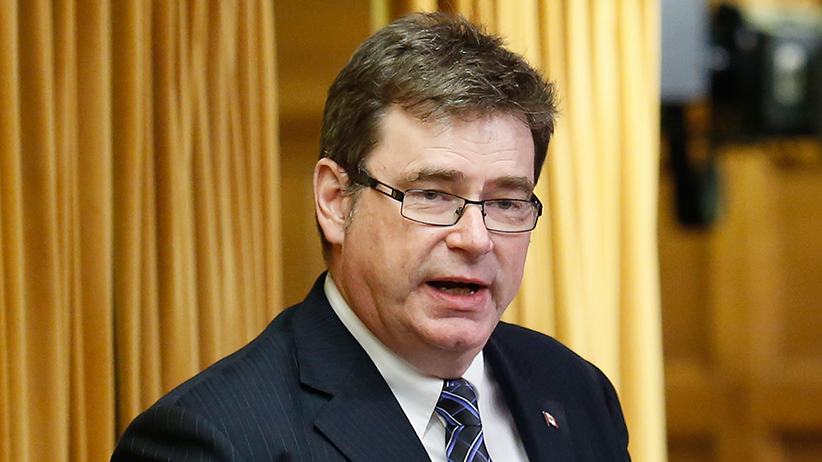Brent Rathgeber is having an interesting week
Brent Rathgeber keeps doing Brent Rathgeber things
Independent Member of Parliament Brent Rathgeber speaks during Question Period in the House of Commons on Parliament Hill in Ottawa June 18, 2013. REUTERS/Chris Wattie (CANADA – Tags: POLITICS) – RTX10SJV
Share

For the purposes of mocking and challenging the Conservative government, Brent Rathgeber is perhaps better placed than any other MP in the House. As an Independent, he is basically free to say and do whatever he wishes. As a former Conservative MP, he has the symbolic import of a former ally. And as an ideological conservative, he stands a sort of haunting spectre of philosophical consistency for a government that is otherwise unchallenged on the right of the political spectrum.
This week he has been particularly mischievous.
On Tuesday, he took his turn in question period. With his first opportunity, he took the Prime Minister’s apparent support for an Alberta-style carbon levy, tied it to the government’s rhetoric on carbon taxes and wondered aloud, “When will Canadians hear more details about the Prime Minister’s proposed multi-billion-dollar, job-killing carbon tax, levy, tech fund or whatever else he decides to call it?”
Next, after an undaunted Leona Aglukkaq had insisted on the government’s opposition to a carbon tax, Rathgeber took his second opportunity to lament for the government’s spending of $750 million on advertising. “Does the government that brought us the Federal Accountability Act not believe in protecting taxpayers from using public dollars that advance partisan ends?” he asked. In response, Tony Clement stood and lamented for Rathgeber’s tone before retreating into the sort of explanation that a Conservative MP would surely never accept from a Liberal minister.
For his next trick, Rathgeber stood after question period today and tabled a bill that would behoove the federal government to generally balance its annual budget—the sort of thing the Conservatives promised in 2013, but have yet to table. Rathgeber has already had a turn in this Parliament at having a bill debated—the ill-fated C-461—so his new bill has no chance of passing unless the government decides to adopt it. Failing that, it might still sit as some sort of legislative taunt.
It is also but one of four bills that Rathgeber apparently plans to table in the next while—the others would increase oversight for the Communication Security Establishment, introduce a mechanism for constituents to recall their MPs and limit the size of cabinet. (That last one came up when I wrote about reducing the number of ministers a couple months ago.)
The merits of those ideas might be debated (I don’t see much value in balanced-budget legislation and I think the idea of recalling an MP is counterproductive), but they are interesting ideas and perhaps particularly interesting for a conservative-minded MP to pursue.
So continues the Rathgeber Experiment and so I returned to the question of whether an MP could conduct himself as Rathgeber has and still remain in a party caucus. Perhaps if he didn’t have to run for re-election without the benefit of party support he wouldn’t be as assertive in questioning the government or tabling bills—as an Independent MP there’s surely cause for him to be seen and heard demonstrating his own utility. And possibly it’s too much to imagine a backbench MP openly mocking his own party as Rathgeber did this week in QP.
But still, in the abstract, could someone acting, sounding and voting as Brent Rathgeber does be included in the party system without the party system collapsing into irredeemable chaos? It would surely be a more interesting system. The question, I suppose, is whether we could all handle that level of interesting.
And to Rathgeber’s words and deeds this week, you can add his deliberations on what he will do next week when the House votes on whether to extend and expand this country’s military effort against Islamic State. At this point, he is undecided.
“I am undecided and conflicted, especially regarding the inclusion into Syria,” he tells me. “I go home tomorrow and want to discuss the matter with as many constituents as I am able to over the weekend and that, plus the debate in the House and the media will determine how I ultimately vote.”
This arguably puts Rathgeber in possession of one of the two interesting votes in the House on this mission, the other belonging to Liberal MP Irwin Cotler, who abstained the last time the House voted on this mission. Before yesterday morning it was interesting to see how the Liberals would vote. But with that now settled, nearly all of the votes in the House will break along party lines. Rathgeber’s seems legitimately open to persuasion. That such a vote must break on party lines is not nearly a rule: when the British Parliament voted last fall to approve military intervention in Iraq, there were 30 MPs who broke with their respective parties.